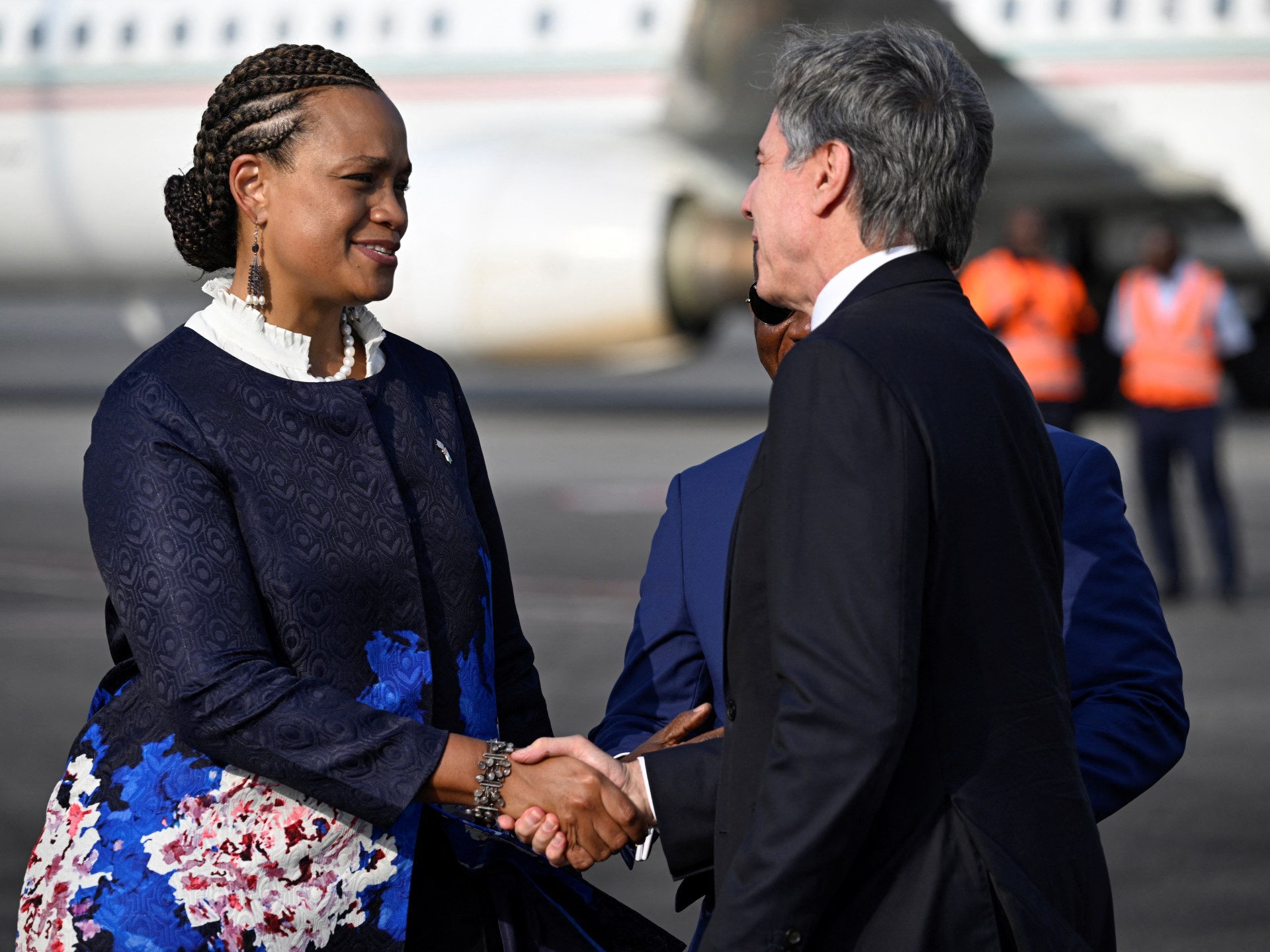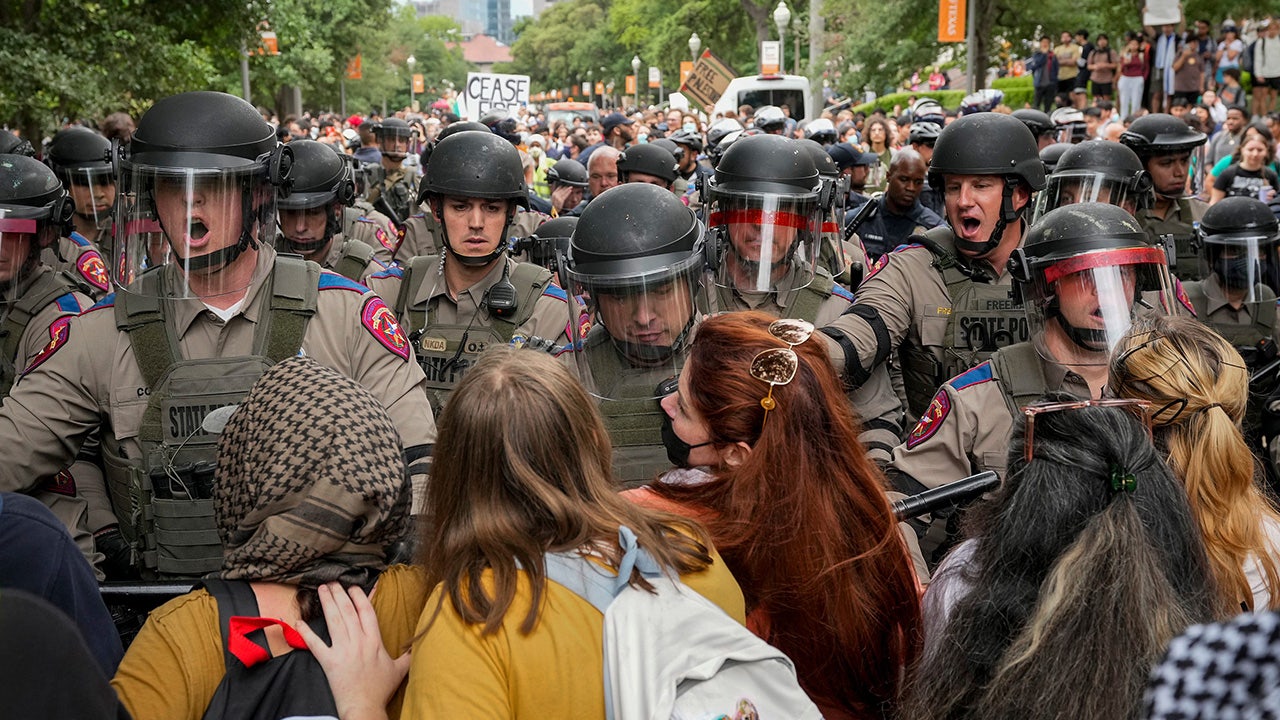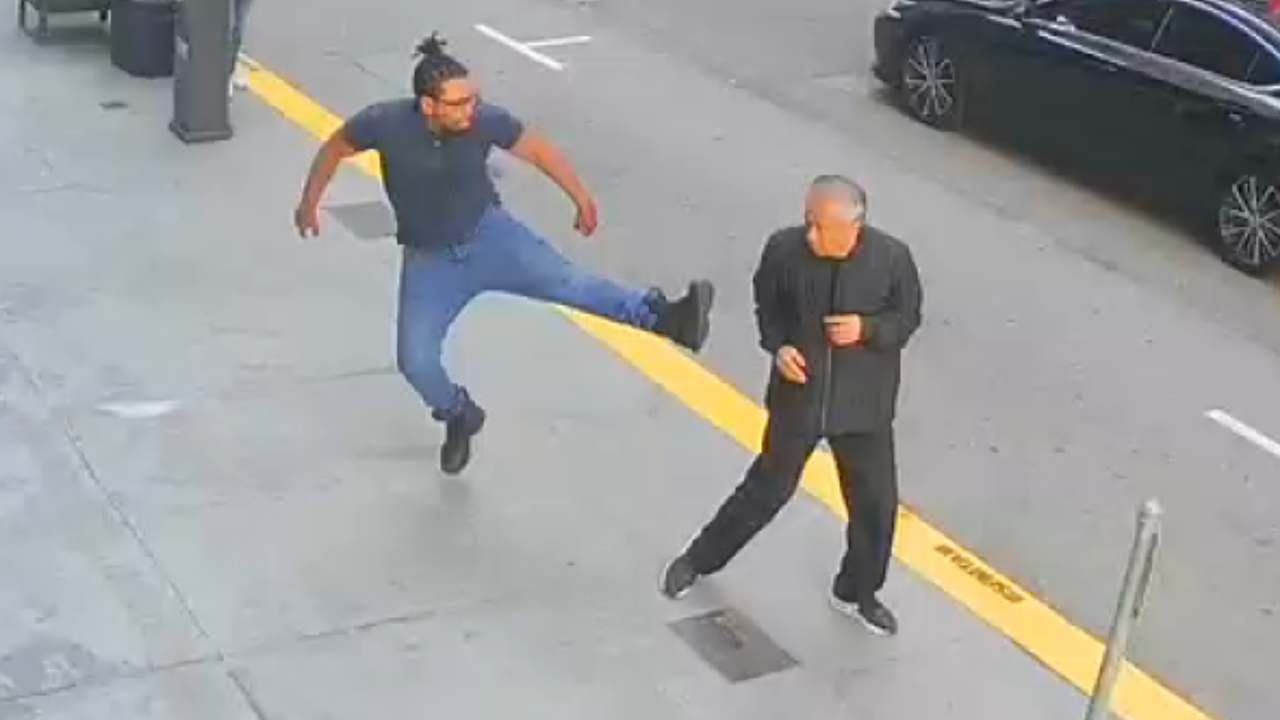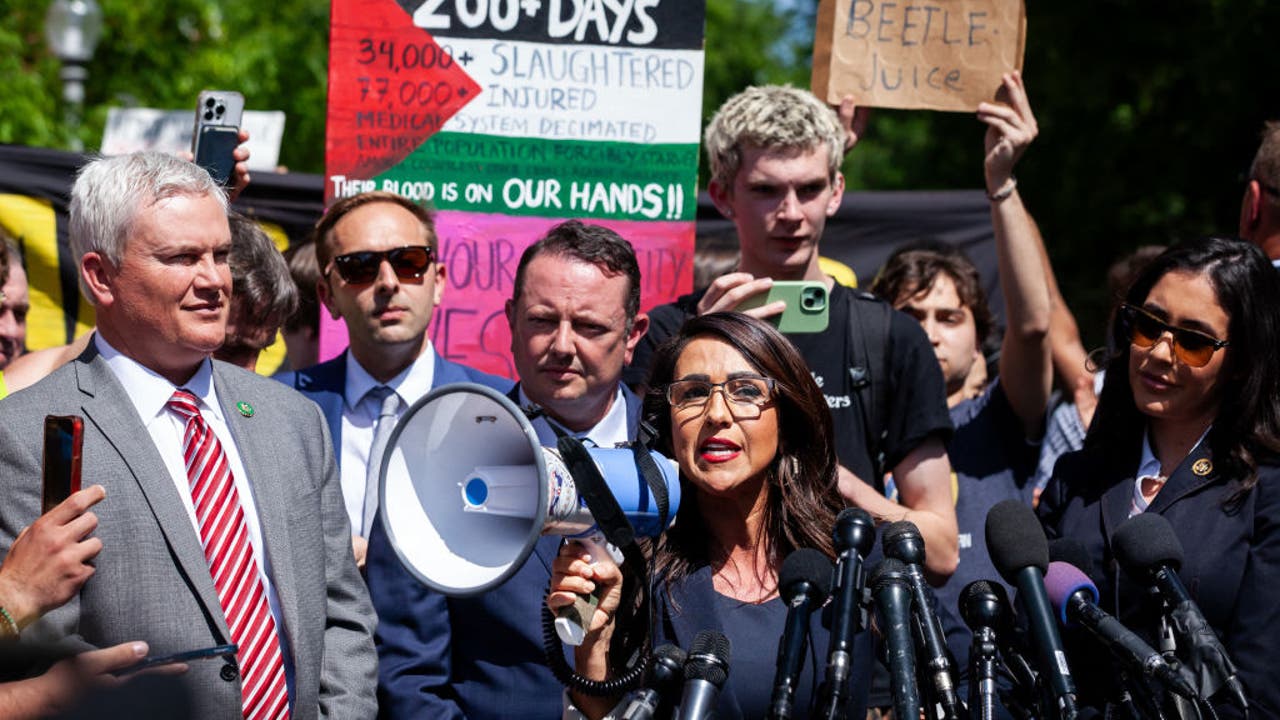World
Blinken hails Ivory Coast fight against armed groups on West Africa tour

The US diplomat is on a four-nation tour after months of being occupied by the Middle East crisis.
US Secretary of State Antony Blinken on Tuesday praised the Ivory Coast for choosing a less militarised approach to security during his four-nation tour to rally African democracies as crises engulf the region.
In the capital Abidjan, the top United States diplomat hailed the Ivory Coast’s stand against last year’s coup in Niger and its approach of “building security together” by investing economically to combat rebel violence in northern areas bordering Mali and Burkina Faso.
“I have to applaud the approach that’s been taken by Cote d’Ivoire – working with communities, listening to communities, making sure that their security forces understand the needs, the concerns of communities,” Blinken said alongside the Ivory Coast’s President Alassane Ouattara. “I think that can serve as a very powerful model for other countries.”
The Ivory Coast has not experienced a major armed attack in two years, despite being bordered by Sahel countries fighting insecurity.
Blinken nonetheless promised to boost cooperation on the ground with the Ivory Coast, largely the training of security forces. He said the US would provide an additional $45m to West African nations as part of a plan to battle instability, bringing total funding under the year-old programme to nearly $300m.
Ouattara, a veteran leader who has won US praise for consolidating democracy, expressed appreciation for the US assistance and voiced alarm over a spate of coups in West Africa.
“Like the United States, we are very committed to democracy and justice,” he said, promising that his government would do “everything possible to improve people’s day-to-day lives.”
Blinken met with Ouattara before heading to Abuja to see Nigerian President Bola Ahmed Tinubu, elected last year on a platform of economic reforms.
Both West African nations have largely stood by the US – as has another key partner, Kenya – despite unease in much of the continent over the Western focus on arming Ukraine and, more recently, US support for Israel’s war with Hamas.
Their stance stands in contrast with another heavyweight, South Africa, which the US has accused of allowing arms shipments to Russia and which most recently annoyed Washington by bringing a genocide case against Israel before the International Court of Justice.
On this trip, Blinken will visit another Southern African country – Angola, which is playing a vital role in mediation to end unrest in the neighbouring Democratic Republic of Congo.
And on Monday, he stopped in Cape Verde, a long-standing partner of the US.
Blinken has sought to showcase a softer side during his trip.
On Monday, he attended a football match in the ongoing Africa Cup of Nations between Ivory Coast and Equatorial Guinea, when his hosts gifted him an Ivorian orange jersey bearing his name.
Blinken, who has been occupied by the Middle East crisis, is making his first trip to sub-Saharan Africa in 10 months.
On his last visit to the region, he travelled to Niger to bolster elected President Mohamed Bazoum. Four months later, the army deposed Bazoum.

World
Arizona Senate repeals near-total 1864 abortion ban in divisive vote

The repeal of abortion ban was passed 16 to 14 and is expected to be signed into law by Governor Katie Hobbs.
The Arizona Senate has voted to repeal the state’s 1864 ban on abortion, which would otherwise have taken effect within weeks.
The repeal was passed by the Senate in a 16-14 vote on Wednesday and is expected to be signed swiftly by Governor Katie Hobbs, a Democrat. Two Republican senators crossed party lines to vote in favour of repealing the ban.
The Arizona House last week passed the measure after a handful of Republicans broke party ranks and voted with Democrats to send it to the Senate.
“We’re here to repeal a bad law,” Senator Eva Burch, a Democrat, said from the floor. “I don’t want us honouring laws about women, written during a time when women were forbidden from voting.”
Republican Senator Wendy Rogers said in casting her vote to maintain the 1864 ban that repealing the law went against the conservative values of Arizona.
“Life starts at conception. They got it right in 1864. We need to continue to get it right in 2024,” Rogers said.
The fight over the Civil War-era abortion ban in Arizona, a state sharply split between Democrats and Republicans, is the latest flashpoint on women’s reproductive rights in the United States. In 2022, the country’s Supreme Court ended the constitutional right to abortion, leaving it up to states to decide the issue. Conservative-led states quickly invoked strict bans on the procedure within their borders.
Democrats across the US, confident that public opinion is on their side in supporting abortion rights, have sought to elevate the issue ahead of November’s presidential election. Arizona is a key battleground state.
Heather Williams, president of the Democratic Legislative Campaign Committee that works to elect Democrats to state legislatures, said her party would capitalise on the “extreme nature of MAGA Arizona Republicans” who voted to maintain the 1864 law as Democrats try to flip the state’s House and Senate in November’s elections.
Rogers, the Republican state senator, acknowledged the political risks.
“Some colleagues would say it’s politically pragmatic for us to find middle ground,” she said. “We might lose the legislature, we might lose the presidential election. But it’s more important to do what’s right.”
Near-total ban on abortions
The 1864 law was revived by a state Supreme Court ruling on April 9, and unless the legislature intervened, it would have taken effect within 60 days of that ruling, according to state Attorney General Kris Mayes, a Democrat.
If the repeal bill is signed, a 2022 statute banning the procedure after 15 weeks of pregnancy would become Arizona’s prevailing abortion law. Still, there would probably be a period when nearly all abortions would be outlawed because the repeal would not take effect until 90 days after the end of the legislative session, which is expected to be in June or July.
Planned Parenthood Arizona, a sexual health organisation in the state, announced it filed a motion on Wednesday afternoon asking the state Supreme Court to prevent a pause in abortion services until the repeal takes effect.
The near-total ban on abortions predates Arizona becoming a state.
Under the 1864 law, “every person” who participates in conducting an abortion can be held criminally liable and face a minimum sentence of two years in prison.
There are no exceptions for cases of rape or incest, although there is an exception when the pregnancy puts a woman’s life at risk.
World
Dan Schneider Files Defamation Suit Against Quiet on Set Producers, Says Docuseries Is a ‘Hit Job’

ad
World
University of Tehran professor says protesters at US colleges will support Iran in American conflict

Anti-Israel protests erupt at Fordham University
Fox News correspondent Alexis McAdams reports on anti-Israel protests at Fordham University and the aftermath of NYPD officers clearing out protesters from Columbia University’s Hamilton Hall on ‘Special Report.’
A University of Tehran professor said in an interview that Iran likes seeing protests on U.S. college campuses, adding those are their supporters if there is ever a conflict between the two countries.
Professor Foad Izadi, who, according to the University of Southern California Center on Public Diplomacy, earned his master’s degree from the University of Houston, was seen in a video being interviewed about the protests in the U.S.
“Sooner or later, this kind of support for the Zionist regime by the American regime will diminish. It might not stop completely, but its diminishing is important,” he said. “This is why the demonstrations [on U.S. campuses] are important.”
Izadi spoke as a member of the Islamic Republic, and oftentimes said, “we,” referring to him and the republic.
TRUMP SAYS 4 WORDS ABOUT ANTI-ISRAEL PROTESTS ON COLLEGE CAMPUSES AS ARRESTS SKYROCKET
State troopers in riot gear try to beak up an anti-Israel protest at the University of Texas on Wednesday, April 24, 2024. (Jay Janner/American-Statesman)
“We are watching the demonstrations and like what we see, but it should not end with this,” Izadi said. “If not for the Islamic Republic, the case of the Palestinian idea would have been closed years ago. The idea of resistance belongs to Iran, but on the operational level, when it comes to recruiting connections and building networks, the [Iranian] state has not been involved in a sufficient level.
“These (American students) are our people,” he continued. “If tensions between America and Iran rise tomorrow or the day after, these are the people who will have to take to the streets to support Iran.”
Izadi said there are Hezbollah-style groups in the U.S. that are much larger than those in Lebanon.
VIDEO SHOWS ANTI-ISRAEL PROTESTERS BLOCK JEWISH STUDENT FROM GETTING TO CLASS; UCLA RESPONDS
“America is the Great Satan and our main enemy, but we have hope in these areas,” he said.
Iran expert and Foreign Desk Editor-in-Chief Lisa Daftari provided insight on Izadi’s comments.
“Quite rich to see the same regime that is fixated on torturing, raping, blinding, executing its own college students, is applauding the ignorant college students on American campuses,” she said. “It speaks to their focus on growing their influence outside of Iran.”
UCL ANTI-ISRAEL PROTESTERS ASK SUPPORTERS FOR VEGAN AND GLUTEN-FREE FOOD, ZIP TIES, SHIELDS AND EPIPENS

A protester holds a sign during a march on Columbia University campus in support of a protest encampment supporting Palestinians in New York City, April 29, 2024. (REUTERS/David Dee Delgado)
Daftari explained that Iran has been beefing up terror proxies in the region and paying their way into American universities.
But at the same time, she said, the Iranian people have suffered under the rule of their “barbaric” leaders.
After watching the comments, Daftari also said it was interesting to hear Izadi say they have more Hezbollah followers in the U.S. than in Lebanon.
“Regardless of when these pro-Hamas protests quiet down here in the U.S., it’s apparent the regime has its sights set on manipulating this momentum to launch more attacks here in the West,” she said. “The question then remains will they focus on a physical attack or just the information war, or both?”
-

 Education1 week ago
Education1 week agoVideo: Dozens of Yale Students Arrested as Campus Protests Spread
-

 News1 week ago
News1 week agoLarry Webb’s deathbed confession solves 2000 cold case murder of Susan and Natasha Carter, 10, whose remains were found hours after he died
-

 World7 days ago
World7 days agoHaiti Prime Minister Ariel Henry resigns, transitional council takes power
-

 Politics1 week ago
Politics1 week agoFetterman hammers 'a–hole' anti-Israel protesters, slams own party for response to Iranian attack: 'Crazy'
-

 World1 week ago
World1 week agoPeriod poverty still a problem within the EU despite tax breaks
-

 World1 week ago
World1 week agoUS secretly sent long-range ATACMS weapons to Ukraine
-

 News7 days ago
News7 days agoFirst cargo ship passes through new channel since Baltimore bridge collapse
-

 World1 week ago
World1 week agoTurkey’s Erdogan meets Iraq PM for talks on water, security and trade

















